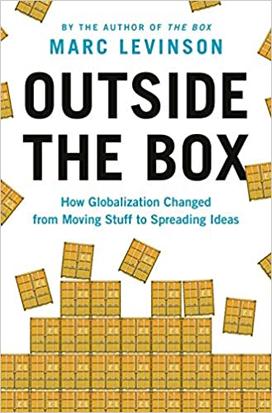Marc Levinson *85 Examines History and Makes Case for New Phase of Globalization
The book: With a fresh perspective on the history of globalization, Marc Levinson *85 challenges the concept that globalization was a result of capitalism. Instead, he examines it as an independent process, undergoing its own developments and rapidly changing with the world around it from World Wars to the COVID-19 pandemic.
Outside the Box: How Globalization Changed from Moving Stuff to Spreading Ideas (Princeton University Press) is an accessible history of how globalization has transformed over the past two centuries. Levinson tracks its stages, ultimately arguing that we are in the early chapter of a fourth phase less reliant on rampant manufacturing where the world’s economy will find new momentum in services, technology, and ideas.

The author: Marc Levinson *85 is an economist and historian specializing in business and finance. He was formerly finance and economics editor of The Economist, worked as an economist at a New York bank, and served as senior fellow for international business at the Council on Foreign Relations. He has written for the New York Times, Harvard Business Review, and Foreign Affairs, and contributed to websites and academic journals. He also reviews books for The Wall Street Journal among other publications.
Opening lines: On August 15, 2006, at five thirty in the afternoon, five tugboats dragged Emma Maersk from the Odense Steel Shipyard and towed her backward to the sea. Whether new or old, ships generally sail forward, not backward, but there was nothing typical about Emma Maersk. The length of four soccer fields, her keel nearly a hundred feet below her deck, the light blue vessel was so enormous she could barely escape the confines of the shallow Odense Fjord. As she passed through the Gabet, the narrow gap between the fjord and the deeper waters beyond, the thousands of Danes lining the beaches were treated to an extraordinary sight. On her launch day, because Emma carried neither cargo nor fuel, she rode high in the water, partially exposing her white underside and showing off the massive bronze propeller that would normally turn silently beneath the waves. It was, as everyone knew from news reports, by far the largest propeller ever cast.
Emma Maersk was a bet on globalization. Owned by Maersk Line, part of a venerable Danish conglomerate, she dwarfed every vessel that had preceded her in the fifty-year history of container shipping. Save for a handful of oil supertankers, there had never been a ship so large. Emma and the seven similar ships that were to follow cost $154 million apiece, much more than any containership had cost before, and the price seemed a bargain. If the new vessels were loaded to capacity, they would be able to transport the world’s trade more cheaply than any other ships afloat. As the world economy expanded and long-distance trade increased with it, Maersk Line’s leaders expected, that cost advantage would enable their company to capture a growing share.
Review: “Levinson deals lucidly with thorny matters of fiscal and trade policy, and though his book presupposes an interest in such things, it requires no background in economics to follow it. A rational, welcome exploration of an international trade that is now at a crossroads, becoming less global than regional.” — Kirkus Reviews












No responses yet